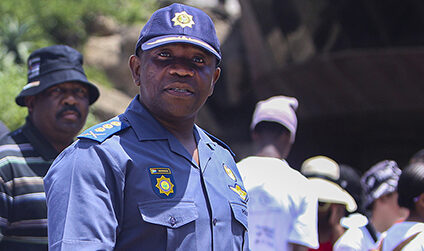KwaZulu-Natal police commissioner Lt-Gen Nhlanhla Mkhwanazi has told Parliament that the 2007 ANC elective conference in Polokwane marked the beginning of the collapse of discipline and professionalism in the South African Police Service (SAPS).
Former President and now uMkhonto weSizwe (MK Party) leader Jacob Zuma was elected ANC president at this conference, which ran from December 16 to 20 at the University of Limpopo in Polokwane.
Testifying before the Parliamentary Ad Hoc Committee investigating his earlier allegations, Mkhwanazi said the political divisions that emerged during that period deeply affected the police.
Command structures weakened
He argued that the deployment of political party members into the service weakened command structures. It also introduced a culture of loyalty to individuals rather than the law.
“The first thing that I think created the problem was to undermine the discipline culture in the police. That we don’t use that culture, the word ‘comrade’ was introduced at the time.
“Police officers and constables started calling the captain ‘comrade’ which was foreign to the police. The moment they started addressing each other like that, it just made the situation worse,” said Mkhwanazi.
He said the Polokwane conference triggered visible political divisions. He described how officers assigned to protect the dismissed deputy president were mistreated by their commanders, who refused them proper support and equipment.
Mkhwanazi said police management who attended the conference were not there to maintain order. They were there to “erect their own marquee tent on the side with alcohol and everything else. To celebrate the victory that was coming”.
Police recruited into political parties
“The unfortunate part that happened is that the deputy president that was fired won that election in Polokwane. And the return of the leadership back to Pretoria changed everything in the police.
“We started getting the recruitments to join political parties within police premises in Pretoria. Within protection services in the main. The division of the police that got affected the most is the PSS, they protect the VIP.
“The members were recruited to join COPE as a political party, police generals in the police premises. So, that was just the beginning of the downfall of what followed thereafter. You then start hearing senior officers in the police started calling ‘comrade, comrade, comrade’. And it became the terminology used throughout,” said Mkhwanazi.
He said the members of crime intelligence might have not necessarily been associated with political parties. But leadership that came in were comrades.
This leadership, he said, arrived at the institution and found resources that made their lives comfortable. And it became a culture that was internally damaging the system. He also alleged that they captured those that were already in the crime intelligence.
Culture of greed emerged
“When these leaders are moving, then anyone that comes in as a leader wants to capture the system. And this one goes and another one wants to capture – it became a culture. I must say that the culture that developed might not necessarily be a political culture, but greed. And members within the service started getting involved in business, started getting interested in money.
“They might not necessarily be politicians themselves, they were pure police officers. But because they knew how the system works, and so these [older people] they don’t know the system. Then they started manipulating it,” said Mkhwanazi.



